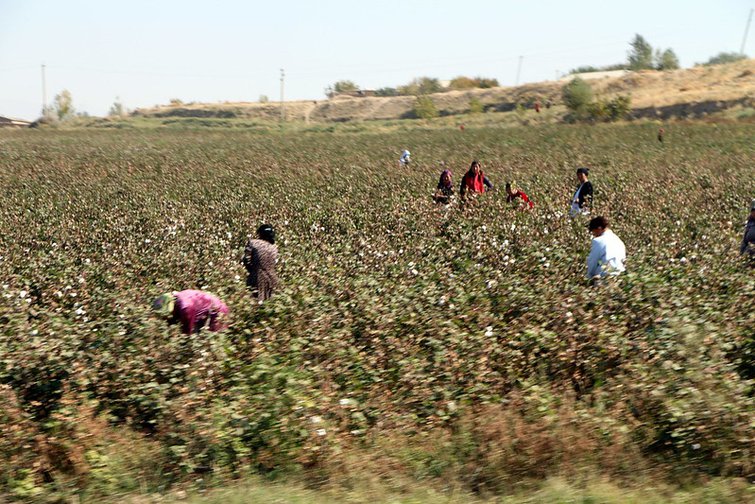A Brief Colonial History Of Ceylon(SriLanka)
Sri Lanka: One Island Two Nations
A Brief Colonial History Of Ceylon(SriLanka)
Sri Lanka: One Island Two Nations
(Full Story)
Search This Blog
Back to 500BC.
==========================
Thiranjala Weerasinghe sj.- One Island Two Nations
?????????????????????????????????????????????????Wednesday, July 1, 2020
UK must end trade complicity in Uzbek forced labour
A new report documents the ongoing use of forced labour in Uzbekistan's cotton sector.
CC BY NC 2.0 MarjoO / Flickr. Some rights reserved
 Gerry Liston-30 June 2020
Gerry Liston-30 June 2020In late September 2019, the Uzbek Minister for Emergencies issued a decree ordering over 2,000 firefighters to participate in Uzbekistan’s most recent cotton harvest. These firefighters were among the many thousands of people forced to pick cotton during this harvest.
According to a recent report published by the Uzbek Forum for Human Rights (UFHR), which has been monitoring harvests for over ten years, those forced to pick cotton in 2019 also included civil servants, bank employees, nurses and paramedics.
Since Uzbek President Shavkat Mirziyoyev took office in 2016, the numbers forced into the cotton fields in Uzbekistan each year have declined significantly – albeit from the staggering high of over a million people under Mirziyoyev’s predecessor Islam Karimov. The use of child labour has also been eradicated. But even according to the International Labor Organization (ILO), whose monitoring has been criticised for underestimating the extent of forced labour in the Uzbek cotton industry, over 100,000 people were forced to participate in the 2019 harvest.
The root cause of the problem has been a system whereby regional and local officials, called hokims, are assigned mandatory cotton production quotas by the government. To ensure that they meet their quotas, hokims order both public and private entities within their jurisdiction to compel their employees to participate in the harvest. Recent increases in state-sanctioned payments to cotton pickers have seen far greater numbers of people picking cotton voluntarily. But structural labour shortages, especially in Uzbekistan’s less populated regions, have caused hokims to continue to resort to forced labour.
The announcement by the Uzbek government in March of this year that it would abolish the quota system has been cautiously welcomed by human rights organisations. However, UFHR monitors have found that forced labour was prevalent on farms operating under a new production system which is designed to replace the quota system. Under this system, farmers contract with private companies rather than with state-owned cotton ginning factories. According to UFHR, the continued use of forced labour on privately operated farms is explained by the fact that the contracts entered into between farmers and the private companies contain production targets whose fulfilment are overseen by hokims.
It is in this context that human rights organisations have been dismayed by the ILO’s conclusion that forced labour in the most recent two harvests has not been systematic. The ILO’s view is based on its assessment that the Uzbek government has not methodically forced people to pick cotton on the basis of an official policy. Even leaving aside the fact that this conclusion is contradicted by the ministerial order directed at firefighters last September, this is a remarkable view for a body tasked with overseeing compliance with international labour standards.
International law is very clear that Uzbekistan is not just responsible for the conduct of its government; it is also responsible for the conduct of its “organs.” As publicly appointed officials, hokims are undoubtedly organs of the Uzbek state. They have also unquestionably been engaged in the organised and deliberate – that is the systematic – forced mobilisation of cotton pickers in the most recent harvests.
It might be expected that in light of this longstanding and endemic practice, the UK market has been off limits to Uzbek cotton produced with forced labour. In fact, since 2001 the UK has been positively encouraging imports of this product via preferential tariffs (i.e. reduced import duties) applied by the EU to certain goods exported by developing countries. Remarkably, despite repeated calls by civil society organisations for it to stop incentivising forced labour, the EU has insisted on maintaining these preferential for Uzbek cotton – even throughout the period when in excess of one million people were being forced into the cotton fields annually.
Following its exit from the EU, the UK has recently entered into a trade agreement with Uzbekistan which commits it to extending “most-favoured-nation” tariff treatment to all Uzbek goods. While no clear exception is made for goods produced with forced labour, the agreement does allow the UK to stop imports based on grounds of “public policy.” With the support of the Global Legal Action Network, Uzbek Forum has brought legal proceedings against the UK government, seeking to compel it to prohibit imports of Uzbek cotton produced with forced labour on this ground.
It should not, however, be left to NGOs to take legal action to stop the fruits of modern slavery entering our markets. Brexit provides the UK with an opportunity to show leadership on this issue by enacting a ban on Uzbek cotton – and indeed all goods – produced with forced labour. This is hardly a tall ask of a country with a reputation for being a global leader in tackling modern slavery.
